PDF chapter test TRY NOW
"The Comet II", written by Jayant Narlikar, continues from where "The Comet I" ended. Sir John Macpherson had chosen to organise a world conference after a debate with James Forsyth in the lesson "The comet I." Mr. John's decision to hold a world conference to seek a solution to the problem of Comet Dutta colliding with the Earth brought the 'The comet I' story to an end, but it wasn't the perfect solution. As a result, it was expected that comet II would address the problem foretold in comet I.
The lesson, comet II, begins with the end of Mr. John and James' discussion. The conversation between John and James ended around 1 a.m. Sir John finished planning for an international conference with scientists and experts all around the world. Mr. John then dropped James off at the Regent Street hotel where he had made a reservation. It was midnight, so there was hardly anyone on the street. Regent Street, in the heart of London's West End, is known for its flagship stores and worldwide brands and is one of the world's most prominent lifestyle destinations. James looked out his window at the magnificent sky, which was shrouded in stars. Then he remembered Comet Dutta, which was around one of those stars and on the verge of colliding with Earth. It was difficult to accept the impending disaster on such a lovely night, so James wondered whether he had made a mistake in his calculations.
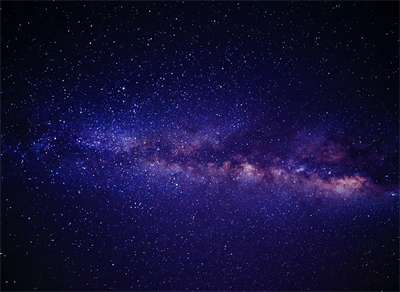
Star-studded sky
Sir John informed James that an international conference with scientists from all around the world would be held in a week, but James was sceptical. The day of the conference had finally arrived. James was taken aback as he arrived at the conference. It was because John kept his word and organised a conference with experts and scientists from all around the world. Astronomers, computer scientists, nuclear physicists, space technologists, and biologists were all present at the international conference. Mr. John also invited Manoj Dutta, the astronomer who discovered Comet Dutta, as a special guest to that secret meeting.
John organised a week-long international conference that took place in total secrecy. The meeting was held in response to James' prediction that Comet Dutta would collide with the Earth in \(10\) months, destroying it. As a result, scientists initially focused on double-checking James Forsyth's calculation with the most recent Comet Dutta observations.
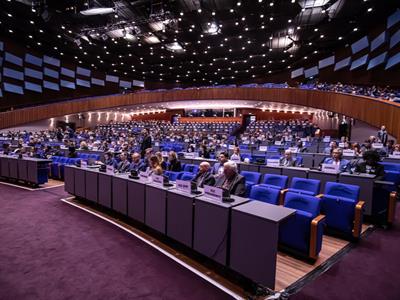
International conference
People at the meeting verified James' prediction with extensive research and meticulous calculation. Comet Dutta was almost certain to collide with Earth, as James anticipated, and there were few possibilities that the projected collision would not take place and the comet would only graze the earth's atmosphere. There would very likely be some loss of devastation and damage on the Earth, if not the whole planet, in such an occurrence. However, there was no longer any use in taking chances with such unlikely possibilities because there were more chances for a collision to occur. As James' prediction was true, experts and scientists at the conference focused on methods to avoid Comet Dutta colliding with Earth.
Despite the fact that the conference decided to take action against Comet Dutta, they were unsure of the best strategy. Before the crash, several people recommended building subterranean bunkers to live in. After much discourse, experts at the meeting decided that defensive strategies such as living in subterranean bunkers were not a viable choice. Then, some scientists suggested employing an offensive strategy against Comet Dutta, claiming that by doing so, the comet might be attacked and diverted off course.
When the scientists decided to deflect Comet Dutta's route, they advised using the bulk of destructive nuclear power available on Earth, since it could help with such a massive undertaking. Such a job was supposed to be accomplished by a huge nuclear explosion that was appropriately positioned, directed, and timed.
It might be done by loading the nuclear payload into a spaceship, sending it out to meet the approaching comet, and then exploding it using a remote control. It was the decision of the worldwide conference participants. It was also decided to keep the plan secret, whether it was a success or a failure because it would cause a lot of anxiety among people. The project was code-named ‘Project Light Brigade' by scientists. The Charge of the Light Brigade was a failed military operation featuring British light cavalry led by Lord Cardigan against Russian forces. It honours heroic soldiers who risked their lives to achieve their goal. The project is named as that as, people in the conference were not sure of the operation's success result. And, finally, a timeline for the "Project Light Brigade" operation was created.
Experts had already decided that the collision of Comet Dutta with the Earth was unavoidable, and there were few possibilities that it would not hit the Earth or change its course. As a result, experts have opted to hold off the operation until October \(9\) to see if those few possibilities work out and certain key dates were set for the execution. It was agreed to launch the spacecraft on October \(10\) with a payload of nuclear power obtained from Earth unless the comet had already been destroyed by natural causes or changed its path due to unexpected circumstances. On November \(15\), the payload would detonate when the spacecraft approaches the comet. If the charge of the Light Brigade fails, Comet Dutta would most likely strike the Earth on December \(15\). Fortunately, if the Light Brigade initiative succeeds, Comet Dutta would pass by at a safe distance, even if it gets closer to the Earth.
Despite the scientists' decision to launch a spacecraft with a massive nuclear explosion, the experiment's success largely depends on the comet's size. No one could tell how massive the comet was since no one could predict its size.
Scientists were working on the 'Project Light Brigade' with the support of nuclear power on Earth, hoping that it would successfully divert 'Comet Dutta' and rescue the Earth. Scientists and experts at the conference hall hoped that the 'Project Light Brigade' would succeed, but they were uncertain.
Duttada was sceptical about the effectiveness of the 'Project Light Brigade,' therefore he sought Sir John Macpherson's opinion. Duttada and Sir John Macpherson became good friends during the one-week conference. Sir John answered Duttada's question by saying he would wait until December 15 to buy Christmas gifts. It indicates that even Sir John suspected the success of the Project Light Brigade.
After the conference was over, Duttada stayed in England for about two weeks, and he had a pleasant time visiting observatories. He met with amateur and professional astronomers and shared ideas with them.
Duttada returned to India following a three-week stay in England. When he arrived back at the airport, he was greeted by a huge gathering of close friends, social leaders, students, and the usual hangers-on. People assumed that Duttada was invited to England because he discovered Comet Dutta. He made his way to the waiting car, loaded with garlands and bombarded with questions from the press.
Duttada returned to Calcutta after a three-week absence. When Duttada returned home, he was surprised to find another big crowd gathered in front of his house, which was surrounded by a pandal. He didn't understand why guests were invited to his house. He cast a suspicious gaze at his wife, Indrani Debi. Indrani Debi was fully aware of her husband's dislike of crowds. So, Indrani appeared a bit nervous in front of her husband. She then informed Duttada that people had been invited to the yajna she had organised and that priests had been called to bless Duttada.
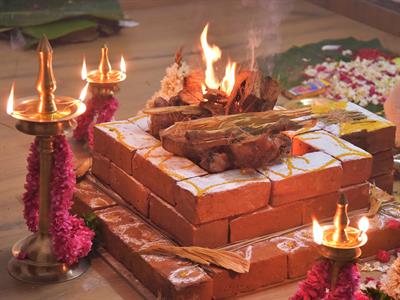
The Yajna
The motive for Indrani's yajna was apparent. She may have planned for yajna at home since she felt the discovery of Comet Dutta was connected with bad luck. Duttada fought with his wife because he didn't want the yajna to be done at home. He was enraged at her for organising a thing (yajna) that he hated since he believed that doing yajna would be useless. He questioned Indrani whether she had planned the yajna because he was out of India, knowing well that such rituals would be disapproved by him. He also wanted to know if she thought Duttada would approve of such rites. Moreover, in any situation, Indrani was well aware of his opinions about those pointless rituals.
Indrani Debi sought assistance from Sibaji Babu, Duttada's younger brother because she could not avoid her husband's rage in any manner. Duttada's rage terrified Sibaji Babu as well and so he coughed a bit without knowing how to tackle him. He then began by gently explaining that Duttada's family members had been disturbed since the discovery of Comet Dutta. Guruji recommended doing a shanti yajna to pacify the evil force behind the comet. As a result, Duttada's guests were invited to the yajna, and they awaited Duttada's arrival because he (Duttada) was the one who had to perform the pooja.
Despite Duttada's younger brother's best efforts, the reasonable mind of Duttada could not accept them. He didn't think it was beneficial to conduct the rituals. Though he appeared calm on the outside, he was furious for organising such a ceremony. But, when Duttada overheard his family members stating that the comet he had spotted would not hurt anybody on Earth provided they performed yajna, he became enraged. Duttada argued with his family members that performing such poojas in the hopes of averting the comet's harmful effects is nothing more than superstition.
He also explained to them that their forefathers might have conducted such yajnas in the past in the hopes of reducing the adverse impacts of comets since they had no idea what comets were as they lived in a world prior scientific progress.
Duttada further informed his family that it was not the case in contemporary times, and that comets are recognised for what they are, that their motions can be anticipated accurately using mathematical calculations, and that statistical studies have shown that their appearances have no link with the calamities on the Earth.
After mentioning the aforementioned points, he informed his family members that discussing all of them was pointless since individuals like Duttada's family members never read even elementary science textbooks.
When Duttada was explaining his point of view vehemently, his younger brother, Sibaji Babu, interrupted him, stating that their wise predecessors used to perform such rituals and encouraged such yajnas. Duttada, on the other hand, refused to accept his family's explanations and was keen on attending the yajna as well.
After returning from London, Duttada kept in touch with Sir John Macpherson on a regular basis. They became close friends after appreciating each other's qualities. Duttada liked Sir John's discipline and efficiency, while Sir John admired Duttada's scientific approach. Despite the fact that they were not discussing Project Light Brigade, their connection served to strengthen their friendship.
Friendship blossomed between them as a result of their good understanding and nature. They never mention Project Light Brigade in their letters because they don't want anyone to know about it. Sir John would occasionally provide Duttada with hints about Project Light Brigade's progress in his letters to Duttada. This would assist Duttada in understanding the state of Project Light Brigade, even if Sir John did not specifically mention it. Perhaps because information on Comet Dutta was kept secret, Sir John did not go into much detail regarding the project's progress in his letters to Duttada.
Meanwhile, as Comet Dutta circled the Sun, it began to grow its tail, as expected. This is because, as a comet approaches the sun, the heat forces its gases to evaporate, releasing dust and microparticles. The movement of these components, which form a tail, is influenced by the sun's radiation pressure.
A comet can sometimes disintegrate altogether. Comet Dutta did not vanish because it was less likely to evaporate as it approached the sun. Furthermore, no natural disasters destroyed Comet Dutta. As a result, Project Light Brigade scientists realised that the chance of a collision had significantly increased. And, if the international conference's decision to halt Comet Dutta from attacking the Earth was not followed, Comet Dutta was set to hit the Earth on December 15.
Duttada got a letter from Sir John in the middle of October. In the middle of reports on the Royal Astronomical Society's annual conference, the unexpectedly warm weather, the opening matches of the football season, and a recent bye-election, Duttada's much awaited message was also mentioned by Sir John that the Light Brigade's charge had begun. As a result, it's been assumed that the operation against Comet Dutta has begun. The spacecraft was launched on schedule by scientists (October 9). They were also expecting that Comet Dutta's nuclear explosion would be deflected by the launched spacecraft.
Though it was mentioned that the spacecraft was launched, Duttada was sceptical about whether the spacecraft would arrive on time and at the correct location to meet Comet Dutta. Is it possible to detonate a bomb with a remote control? What happens if the gigantic nuclear pile doesn't go off? After reading the letter, Duttada was disturbed by a slew of questions.
Despite the fact that Duttada's mind was filled with numerous questions and he was worried about the results of Project Light Brigade, he was in a situation where he couldn't express his worries with anybody since the project's details were to be kept secret. He was forced to participate in Puja ceremonies, Diwali festivities, and other holidays, which he seemed to enjoy despite the fact he did not. Generally, in the month of October, Hindu festivals such as Durga Puja, Navaratri, Dussehra, Ekadashi, Pradosh Vrat, Purnima Puja, and others will be held across India, followed by Diwali in the first week of November.
Spending time with Khoka, his eight-year-old grandson was his only source of daily relaxation. The name 'Khoka' means 'baby' in the Bengali language. Duttada looked through Dibya at night to check on Comet Dutta's progress.
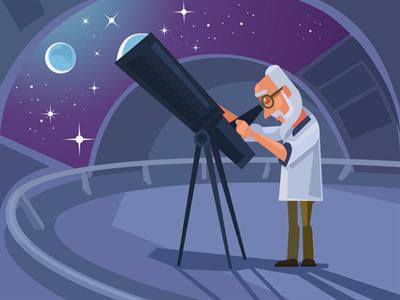
Duttada - observing Comet Dutta's progress
Duttada kept a close eye on the comet through his eight-inch Dibya telescope, and he was quite concerned about the outcome of the spacecraft deployed to deflect Comet Dutta. After some days, Comet Dutta became visible to the human eye, letting ordinary people observe it.
On November 18, Duttada received an urgent telex message from the British Council through a special messenger. The telex operator in Calcutta had no idea why it was so urgent. After reading it, Duttada lost all sluggishness and raced to his favourite rasagolla shop. The reason for it was that John Macpherson had stated in that message that he was so confident in buying Christmas gifts on December 15th. It indicates that the project Light Brigade's attempt to deflect Comet Dutta via nuclear explosion was successful. As a result, there was no chance that Comet Dutta would collide with the Earth on December 15th. Duttada was overjoyed and purchased sweets as a result of it.
On December 15th, Comet Dutta came within \(80,000\) kilometres of the Earth. It grabbed the attention of millions of people all around the world. Comet Dutta was admired by them. But, only those connected to the Project Light Brigade realised how close it (Comet Dutta) had come to destroy the planet. However, as predicted by experts, it did not strike the Earth since its path was diverted owing to the successful operation of the Light brigade's spacecraft. After a while, Comet Dutta had faded away and was no longer visible.
After a lengthy period of mental turmoil, Duttada felt at ease. He inquired whether his wife was happy that Comet Dutta had caused no harm to anyone on Earth. She agreed with his statement and told him that Comet Dutta could have destroyed the Earth, but it had not happened. Hearing her remark, Duttada was taken aback. He was quite certain that he hadn't told anyone about the Project Light Brigade. She went on to ask Duttada, confidently, whether he knew why Comet Dutta had vanished without causing harm to the Earth.
Duttada was so taken aback that he glanced at his wife in astonishment. He suspected whether his wife was aware of Project Light Brigade. He knew that he did not tell her anything about it. Even when the project (Light Brigade) was completed, he kept the project secret to himself and did not share it with his wife.
Duttada carefully responded back to his wife's inquiries, pretending to be ignorant of her question, and she informed Duttada that Comet Dutta had passed by without damaging the Earth as a result of the yajna they had performed at Duttada's residence. Duttada was relieved in one way after hearing her wife's response, as he was comforted to learn that his wife knew nothing about the Project Light Brigade. Still, he couldn't understand how his wife was referring to unperformed yajna, because as he knew, he didn't perform any yajna at home. He had refused to take part in it as well, considering those rituals as superstitious.
Indrani Debi revealed the secret to her husband following his question, saying, yajna was performed on that particular day at Duttada's home by their grandson Khoka as per Guruji's advice. According to Guruji, a descendant of Duttada could perform yajna on behalf of Duttada. So, since Duttada refused to perform yajna at home, Indrani made her grandson to do it on behalf of him. Indrani also praised Guruji as a clever person since he had come up with a idea that had worked well because, according to her, such an idea had caused Comet Dutta to pass Earth without harming anybody. Her voice had a strong tone of accomplishment about it.
When Duttada heard his wife mention that their eight-year-old grandson had done yajna, he became speechless. He then envisioned Khoka performing yajna by chanting mantras he didn't understand and pouring ghee into the fire at specified intervals and offering flowers. His rational mind couldn't comprehend how his family could believe in letting an eight-year-old child who didn't even grasp the meaning of mantras or the yajna process to execute it. He then compared it to a mental image of an international conference of scientists and experts gathered in England to address Comet Dutta's problem.
While participants at the conference strained their brains for solutions to the Comet Dutta dilemma, Duttada's family took a superstitious approach to the matter, thinking that conducting yajna would prevent Comet Dutta from causing damage to anybody on Earth. He was perplexed by the disparity between the extremes on both sides. It was difficult to accept that both images depicted distinct aspects of contemporary human society.
Duttada was fully aware of the disparities between the rich and the poor, educated and ignorant, and privileged and underprivileged people. But he couldn't grasp the difference between the rational and the superstitious; because his viewpoint was rational, he didn't believe in superstitions because they aren't scientifically proven.
In the final section, the author poses a question to the readers, wondering if human civilisation would ever be able to bridge the gap between the rational and the superstitious. Dutttada wondered when the divide between rational and superstitious people will be bridged. Though Duttada advised his family about superstitious beliefs, they were unconcerned and performed yajna in the hopes of saving the Earth from the effects of Comet Dutta. Duttada was well aware of how scientists and experts took the initiative and made preparations in order to deflect and divert Comet Dutta's path. Unfortunately, he couldn't explain it to his family. Nonetheless, he made a great effort to explain the nature of comets and the scientific advances used to track them to his family members, particularly his wife. Nothing worked because their superstitious beliefs made it impossible for them to think rationally.
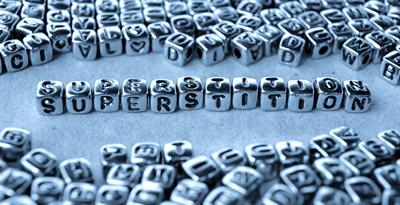
Irrational beliefs still exists
Even though technology has evolved to the point that we can defend ourselves from most hazardous things, such as Comet Dutta's impact, some individuals remain superstitious, which is even more dangerous than Comet Dutta's collision.
